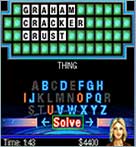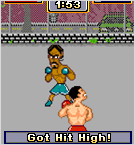Trending
Opinion: How will Project 2025 impact game developers?
The Heritage Foundation's manifesto for the possible next administration could do great harm to many, including large portions of the game development community.
Sony Pictures Television recently announced its slate of mobile games for release in 2007, including Jeopardy! 2007 and God of War: Betrayal. In this Games On Deck interview, we talk to Eric Berger, VP of Mobile Entertainment, about Sony Pictures Television's upcoming titles and their place in the mobile space.

 Sony Pictures Television recently announced its slate of mobile games for release in 2007, including Jeopardy! 2007 and God of War: Betrayal. In this Games On Deck interview, we talk to Eric Berger, VP of Mobile Entertainment, about Sony Pictures Television's upcoming titles and their place in the mobile space.
Sony Pictures Television recently announced its slate of mobile games for release in 2007, including Jeopardy! 2007 and God of War: Betrayal. In this Games On Deck interview, we talk to Eric Berger, VP of Mobile Entertainment, about Sony Pictures Television's upcoming titles and their place in the mobile space.
Games On Deck: First, can you tell us a little about yourself?
Eric Berger: Currently at Sony I run the mobile entertainment business in the United States. That's everything from our game business to our video business (video over carriers and the movies on memory cards.) I joined about a year ago, and we've got a renewed focus and dedication to the business, both on the gaming side and on the increasing video side. We've been making great progress on developing a series of new titles that we're just starting to bring to the market and some great new video products and video channels for the mobile video space.
GOD: It's interesting to see Sony Pictures Television specifically in the gaming space, albeit the mobile gaming space. Why?
EB: A decision was made recently to move the mobile content business into our Television group at Sony Pictures, largely because of the video side of the business. And so as we develop these largely digital video channels for the mobile space, we tap into not only assets but also the capabilities of our television group to do that.
What is interesting about the mobile space is that we have a history in gaming, and a lot of our carrier relationships and experience with mobile content comes out of the gaming side, and also our biggest titles in the game space, some of the biggest titles on the marketplace, are Sony Pictures Television IP, and that's Wheel of Fortune and Jeopardy.
On some carrier decks right now Wheel of Fortune is one of the top two games in the United States, and Jeopardy is a top 20 title in the industry too. So we're very dedicated in growing these and other titles in the space and extending that into video.


Wheel of Fortune, Jeopardy
GOD: Is it easier to create games based on Sony Pictures Television IP as you're part of the company?
EB: For all brands and franchises from within Sony Pictures, so within Colombia Tristar movie division as well as for the TV division we've got the first rights to develop the properties for the mobile space. And then what we decide is what we think will be a solid mobile brand or not. And we've learned a lot over the years. I think we and many of the Hollywood Studios where they would make a lot of mobile games based around movie titles, and they were highly dependent on the success of the movie, and they would mirror the box office, so when a movie dropped out of the top few slots, the mobile game would do the same.
What we've learned is to be much more choosy about developing franchises even from within our own company, to only develop titles that we think will have more longevity and really connect with the mobile gaming community.
So this year we're only releasing mobile games based around two movie franchises that we think meet the criteria. One is the James Bond franchise. We're releasing a Casino Royale game and we'll be releasing more James Bond games, and the other is Spider-Man. So we're releasing some Spider-Man games because we think the Spider-Man franchise and brand transcends the box-office and has real longevity.
We do exactly the same thing in the television space. So our biggest properties there are Wheel of Fortune and Jeopardy, as I said, and we're always looking to create extensions to those games to make them yet more interesting and interactive to consumers.
After that we also look to our sister companies. Sony Computer Entertainment in particular. We even look beyond. We're in the business of acquiring titles and licensing brands on a regular basis within our core business, and we view mobile in the same way.
Snoop Dogg Cruisin' is an example. It follows on the heels of a successful Snoop Dogg title we developed last year called Snoop Dogg Boxing. We try and balance the portfolio between all of these different aspects.
GOD: How does a franchise like Snoop Dogg Boxing come to be?
EB: We look out in the space, at different things that are either available or interesting across a series of genres, and we were looking to fill a hole that we had with some more urban, casual gaming content. And we looked at a number of different opportunities, and we think that Snoop Dogg's position in the market, he almost transcends his music by this point as a pop-culture icon, so he hits a lot of different demographics while also meeting our urban needs, so looking at our portfolio, a Snoop Dogg title fits perfectly.

Snoop Dogg Boxing
GOD: When people think "gaming" and Sony however they traditionally think of Sony Computer Entertainment. How do you relate internally?
EB: Well, that's another division of what we could call "big" Sony, there's Electronics and Computer Entertainment and so on, and Sony Pictures Television is in the Sony Pictures division. It is a sister company, and we work with them like we work with other divisions of the company, the way we'd work with the Electronics side, or Sony BMG, our sister company in the music space.
In the case of mobile games, we brought one of their IP to market about a year ago, Ratchet and Clank: Going Mobile, and God of War is our second franchise from Sony Computer Entertainment that we're brining to market, and we hope to do more in the future.

Ratchet and Clank: Going Mobile
GOD: Ratchet and Clank and God of War are "hardcore" gamer kind of titles, but you've also talked about Jeopardy and Wheel of Fortune...
EB: I think you're going to see a lot more hardcore gamers coming into industry as the phones and technology get better and also as the publishers begin to step up, which really what we've done with God of War. The phones have gotten to the place where we can do a game like this justice, and that was not the case maybe even only a year or two ago.
We think that the hardcore gamers who may not have experienced the mobile game market before because they viewed it as more of a casual game space that didn't fit into their interests will be extremely impressed by the gameplay here and what you can actually do on a phone today. And that's only going to get better.
As publishers like us begin to tap into these phones potential and these phones begin to flood in to the market more and more over the next few years, I think you will see people begin to extend their experience.
GOD: How do you try and translate a title like that to mobile, with small screens and keypad buttons?
EB: We start with the story. We try and respect the fan as much as possible, and that begins with the story. What we've done is get the same writers as God of War I and II and they've written this game. This is essentially an original story that takes place between those games, so it's very true to the source, and adds real value to a God of War fan because it fills a hole for them - the space between the two original storylines, and it's in the same style and spirit of the games.
Then we try, as much as you can on a phone, add elements of what they're used to. So there's sort of what we call "true God of War combat." So there's a whole series of moves and tools that you use that are true to the style of the original God of War games.
It's on the more violent side of mobile gaming; grabbing heads, ripping them in half, flinging them across the room... There's some things here that you really haven't seen in your typical mobile game, but again, it's true to what people are used to with God of War.
I think we've taken it to a new level thanks to the capabilities of the latest phones. There are 122 animations for the main character, there are 83 unique animated environmental objects in the backdrops, more than you'll see in most games, there are seven different ways to kill enemies. Things that the fan of the God of War franchise would truly, truly value.
GOD: Can you describe your development process?
EB: Sony Pictures has its own mobile games studio, which lives with Sony Online Entertainment, which is a division of Sony Pictures, an so the studio is right here in a fantastic environment and they've got a strong games culture working with people who've worked on Everquest and lots of other classic PC games, as well as mobile games.
GOD: Do you see Sony Pictures taking MMORPGs mobile, with the team's close proximity to Sony Online Entertainment?
EB: You know, I think it's too early. I think the answer is yes, but the answer is when. I think richer gameplay like God of War is what's going to be coming in the next few years, but I think multiplayer is a matter of time.
GOD: How do you reach consumers through the complex number of handsets and carriers that are out there?
EB: We've spent a lot of time, particularly in the last year, building stronger relationships with carriers than we've ever had before to make sure we reach as many consumers as possible. We release games now the way we would release a movie or a DVD or a console game. We pick a date in time, pre-arrange distribution with the carriers, looking towards certain kinds of deck placement and marketing with those carriers, and we create a launch environment.
This is something we didn't do in the past. Games just sort of "came out." With this environment now we can create more buzz, do more interesting things with the carriers, and create better marketing programmes.
In terms of handsets, for every game we bring out, we do an extensive handset review across the market and we try and triangulate three different kinds of data. First: how our games are selling on certain handsets based on previous data. Second, we research in the market how handsets are performing, in terms of sales in the marketplace as well as the sale of data services on that handset. And the third thing we do is talk to carriers about their strategic priorities with those handsets. So we triangulate those streams of data and we make sure that our game is ported to an optimal set of handsets in the marketplace across as many carriers that we're partnered with.
Read more about:
FeaturesYou May Also Like